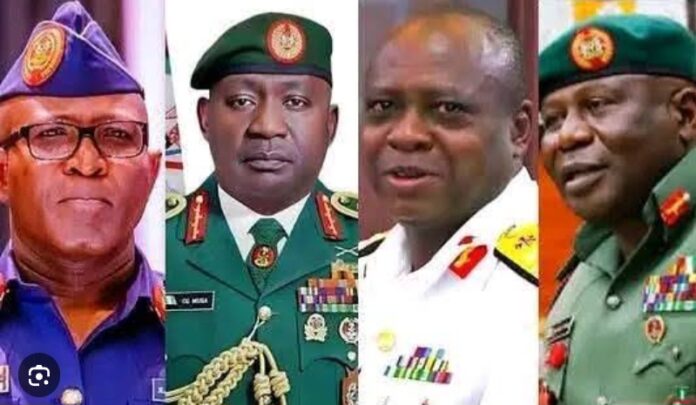The simultaneity of the recent alleged coup plot by top Nigerian military personnel and the sudden military leadership shake-up may not be a mere coincidence, a rights group, the Foundation for Environmental Rights Advocacy and Development, FENRAD, has noted.
Last week, President Bola Tinubu announced the dismissal of Nigeria’s service chiefs, sparking widespread debate across political, military, and civil circles.
Although the Presidency officially stated that the shake-up was meant to ‘inject new direction, vision, vigour and energy’ into the armed forces, the timing of the decision, coming shortly after reports of an alleged coup plot, has raised questions about internal stability within the military and the overall health of Nigeria’s national security architecture.
According to the Presidency, the decision to sack the service chiefs was a proactive step to strengthen the security apparatus and enhance the government’s response to the country’s mounting security crises.
This is as Nigeria continues to grapple with terrorism in the North-East, banditry in the North-West, separatist agitations in the South-East, and communal and economic tensions in other regions.
Speaking on the development, the Executive Director of FENRAD, Comrade Nnanna Nwafor, while acknowledging the President’s constitutional prerogative to appoint and remove service chiefs, said public discourse has been fueled by reports alleging a coup plot involving certain military officers, claims swiftly denied by the Defence Headquarters.
He noted that whether or not a coup was genuinely in motion, the mere emergence of such rumours reflects underlying dissatisfaction, fatigue, and possible mistrust within the armed forces, which he said were warning signs that demand attention beyond mere administrative reshuffles.
Nwafor insisted that the continuous recycling of security heads without structural reforms has not yielded lasting improvements, identifying issues such as inadequate funding, corruption in defence procurement, poor troop welfare, and inter-agency rivalry as consistently undermining effectiveness.
On the way forward, the FENRAD advocated comprehensive security sector reform, to review command structures, redefine roles, and enhance inter-agency cooperation, as well as improved welfare and oversight for personnel.
Nwafor further called for the emplacement of measures to empower the National Assembly and civil society to monitor military operations and budgets, the strengthening of intelligence coordination to detect and defuse potential internal threats before they escalate, and genuine efforts to address socioeconomic roots of insecurity such as unemployment, poverty, and political exclusion.
The FENRAD boss concluded that the sack of the service chiefs amid coup allegations offers both a warning and an opportunity, but also opens a window for meaningful reform.
He said, “National security cannot rely solely on changing faces at the top, it requires rethinking the entire system, its institutions, incentives, and accountability mechanisms.
“Only by addressing the structural and moral foundations of the armed forces can Nigeria safeguard its democracy and ensure lasting peace and stability.”



